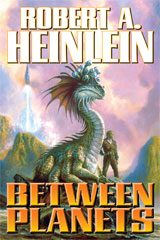
Between Planets is a book about an accident of fate, that only came about because of accidents of fate.
In Between Planets, Don Harvey's accident of fate shunts him to Venus just as an interplanetary war breaks out, and he is separated from family and friends. An accident of fate put Don Harvey between planets.
Accidents of fate put Robert Heinlein between books.
Red Planet, two years before, had been the occasion of such a disturbing row with his editor at Scribner's, Alice Dalgliesh, that Heinlein swore off writing juveniles. (The story is given a once-over-lightly in Grumbles From the Grave.)
Only a force more irritating than Alice Dalgliesh could overcome that upsetting memory—but in the meantime, Heinlein had gone to Hollywood, and Hollywood can out-irritate a children's book editor any day of the week (and twice on Sunday).
Heinlein's Destination Moon script was turning out too experimental and too challenging for the film's financier. When Producer George Pal started talking about converting Heinlein's sober "documentary of the future" into a musical comedy, complete with a chorus line of Moon Maidens, Heinlein went into an emotional tailspin. His wife, Ginny, whisked him off to a ranch in Ojai for the weekend, and then talked him into doing another boys' book for Scribner's—to keep his mind off the Hollywood mess (substituting a lesser pain for the greater).
It worked—and fortune smiled on Robert Heinlein. Not only did the book get written, but the film got back on track and did get made as a documentary of the future, to great acclaim and an Academy Award the next year for Special Effects Heinlein had helped invent. And for a wonder Miss Dalgliesh accepted the book with scarcely a murmur of dissent or criticism. Farmer in the Sky zipped through to publication so smoothly that Heinlein was seduced back to the not-quite-so-Dark-Side for another few years. When he had to stop housebuilding for the winter of 1950-51, Between Planets was the result.
But it took a couple of accidents of fate to make it happen.
And then guile and experience took over from luck.
He didn't have a strong story idea for this book, so Heinlein decided to use an old writer's trick: brush off an old plot and rewrite it with a switch to disguise the self-plagiarism. The new Tom Corbett, Space Cadet television show had just started, though Heinlein couldn't get television reception in the mountains around Colorado Springs. But Tom Corbett was loosely (very loosely) based on Space Cadet, his most successful book to date. He decided to plagiarize it, with a twist: Space Cadet had been about a boy preparing for war; this one could be about a boy overtaken by war, and trying to become a man in wartime, never certain where the right of things lay, as nobody could be when all you can see is the local things that are happening around you, but—
Out of the darkness and confusion certain principles shine out: (a) the bill of rights is a damned good idea (b) absentee landlords are a bad idea (c) people can't vote themselves something for nothing—and collect. (d) Terra is a small place; so is the solar system. Survivor types will meet the challenge by finding more land and bending it to their needs. (e) The folks who stay at home are nutty as hell if they think that their economic problems can be solved for any length of time by levying tribute on colonies. . . . [from Heinlein's outline notes for Between Planets.]
Between Planets slipped through the Scribner's editorial process almost as smoothly as his previous book. Miss Dalgliesh did question his radical and possibly objectionable innovation for boys' books in 1950, the hint of a romance between Don Harvey and Isobel Costello. She also wondered what happened to Isobel after the book ends, left behind on Venus while Don is adopted into an aristocratic Venerian dragon's household and eventually does get to Mars. In a letter early in the editorial process, Heinlein explains:
"As to Isobel, I am pretty sure she got him in the end she seemed like a determined lassie. I toned down the romance for fear of annoying some of my younger male readers. If you want an engagement, implied or explicit, I can put it in in about six words. What do you think we had better do about it? Boys' books seem to assume an almost sexless world, whereas I am prepared to swear under oath that boys start thinking about girls at about the age of eleven and have them on their minds almost continuously for the next ten years . . . But that does not fit the assumptions of the teachers and the librarians whom we must please.
"Perhaps an implied engagement might work for the older readers, but alienate the younger. Best it should be left the way it was."
And that is how it was published.